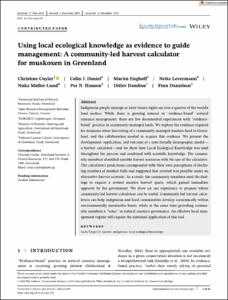| dc.contributor.author | Cuyler, Christine | |
| dc.contributor.author | Daniel, Colin J. | |
| dc.contributor.author | Enghoff, Martin | |
| dc.contributor.author | Levermann, Nette | |
| dc.contributor.author | Møller-Lund, Nuka | |
| dc.contributor.author | Hansen, Per N. | |
| dc.contributor.author | Damhus, Ditlev | |
| dc.contributor.author | Danielsen, Finn | |
| dc.coverage.spatial | Greenland | en_US |
| dc.date.accessioned | 2022-03-25T19:31:58Z | |
| dc.date.available | 2022-03-25T19:31:58Z | |
| dc.date.issued | 2020 | |
| dc.identifier.citation | Cuyler, C., Daniel, C.J., Enghoff, M., et al. (2020) Using local ecological knowledge as evidence to guide management: A community-led harvest calculator for muskoxen in Greenland. Conservation Science and Practice, 2:e159. 14pp DOI: https://doi.org/10.1111/csp2.159 | en_US |
| dc.identifier.uri | https://repository.oceanbestpractices.org/handle/11329/1895 | |
| dc.description.abstract | Indigenous people manage or have tenure rights on over a quarter of the world's
land surface. While there is growing interest in “evidence-based” natural
resource management, there are few documented experiences with “evidence-based” practice in community-managed lands. We explore the evidence required
for decisions about harvesting of a community-managed muskox herd in Greenland, and the collaboration needed to acquire this evidence. We present the
development, application, and outcome of a user-friendly demographic model— a harvest calculator—and we show how Local Ecological Knowledge was used
throughout the process and combined with scientific knowledge. The community members identified suitable harvest scenarios with the use of the calculator.
The calculator's predictions corresponded with their own perceptions of declining numbers of muskox bulls and suggested that reversal was possible under an
alternative harvest scenario. As a result, the community members used the findings to request a revised muskox harvest quota, which gained immediate
approval by the government. We draw on our experience to propose where
community-led harvest calculators can be useful. Community-led harvest calculators can help indigenous and local communities develop economically within
environmentally sustainable limits, while at the same time providing community members a “voice” in natural resource governance. An effective local management regime will require the sustained application of this tool. | en_US |
| dc.language.iso | en | en_US |
| dc.rights | Attribution 4.0 International | * |
| dc.rights.uri | http://creativecommons.org/licenses/by/4.0/ | * |
| dc.subject.other | Aichi targets | en_US |
| dc.subject.other | Harvesting | en_US |
| dc.subject.other | Indigenous knowledge | en_US |
| dc.subject.other | Indigenous rights | en_US |
| dc.title | Using local ecological knowledge as evidence to guide management: A community-led harvest calculator for muskoxen in Greenland. | en_US |
| dc.type | Journal Contribution | en_US |
| dc.format.pagerange | 14pp. | en_US |
| dc.identifier.doi | https://doi.org/10.1111/csp2.159 | |
| dc.subject.parameterDiscipline | Human activity | en_US |
| dc.bibliographicCitation.title | Conservation Science and Practice | en_US |
| dc.bibliographicCitation.volume | 2 | en_US |
| dc.bibliographicCitation.issue | Article e159. | en_US |
| dc.description.sdg | 16 | en_US |
| dc.description.eov | N/A | en_US |
| dc.description.methodologyType | Reports with methodological relevance | en_US |
| obps.contact.contactname | Christine Cuyler | |
| obps.contact.contactemail | chris.cuyler@natur.gl | |
| obps.resourceurl.publisher | https://conbio.onlinelibrary.wiley.com/doi/10.1111/csp2.159 | |
 Repository of community practices in Ocean Research, Applications and Data/Information Management
Repository of community practices in Ocean Research, Applications and Data/Information Management

